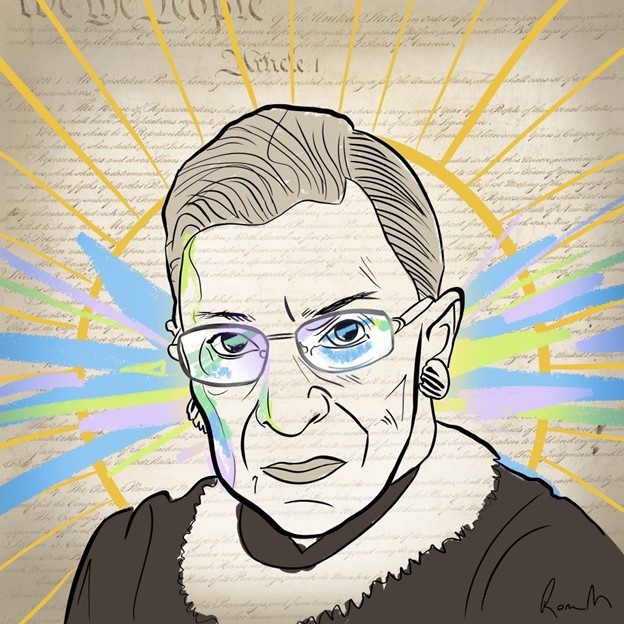Ruth Bader Ginsburg: The Life of a Legend
Illustration of Ruth Bader Ginsburg
My mother told me to be a lady. And for her, that meant to be your own person, to be independent.
— Ruth Bader Ginsburg
A life is not measured by how long one lived; rather, it is measured by what one has left behind. The passing of the second woman to ever serve on the Supreme Court, Justice Ruth Bader Ginsburg, impacted the nation on Sept. 18, 2020. The champion of women’s rights and social justice leader died at 87, surrounded by her family at her home in Washington, D.C. In today’s America, the death of a Supreme Court Justice hits deep at the roots of the nation’s core values – of life, liberty, and freedom for all. Ginsburg embodied the voice of a woman in power and paved the way for women to continue to share their voices with the world.
Justice Ginsburg was born in 1933 and later graduated from Cornell University in 1954. There, Ginsburg met her husband, Martin, and finished first in her class. During that time, Cornell had a ratio of four men to every one woman on campus. After having a daughter together, Ginsburg and her husband both enrolled at Harvard Law School. During her time at Harvard Law, Ginsburg’s husband fell ill with cancer. She adapted to working late into the night to care for both her husband and her daughter, while always being at the top of her class and making the law review. Ginsburg also learned to balance life as a mother and as a student in a very male-dominated class (only eight of the 500 graduates were female). Without realizing that her career would change women’s rights, Ginsburg noticed the gender discrimination she faced during her schooling. In the movie RBG, based on her life, Ginsburg shared that she was denied entry into a room at one of Harvard’s libraries because of her gender. She also said she, along with other women, were questioned by the dean about why they would take the place of men who could have attended Harvard. Ginsburg was one of the pioneers of women in professional careers, proving that she could have a family, care for her sick husband, face the challenges of being a woman, and remain at the top of her class.
Ginsburg moved to New York City during law school and graduated from Columbia University, where she had transferred from Harvard in 1958. Several law firms refused to hire women regardless of their resumes. Ginsburg became a teacher at Rutgers University Law School, and she later became the first female tenured professor at Columbia University. During her time as a professor, she served as the director of the Women’s Rights Project in the 1970s. In 1980, Bader was appointed to the U.S. Court of Appeals for the District of Columbia. During the decade, Ginsburg brought six cases to the Supreme Court and won five of them. Throughout the years, Ginsburg was the leading figure in gender discrimination litigation.
Each of Ginsburg’s landmark cases was a steppingstone to changing the Supreme Court’s view on gender discrimination. She explained in the movie RBG that the court at the time was not necessarily aware there was a gender inequality issue. Every case she won was a step forward. Ginsburg took on cases that denied women rights, such as equal pay and benefits. She also took on a case in which a man’s right to his wife’s Social Security income after she passed was denied. This case proved that she was not only against female discrimination but against all sex discrimination.
On June 14, 1993, President Bill Clinton announced his Supreme Court nomination of Ruth Bader Ginsburg to replace retiring Justice Byron White. She was endorsed unanimously by the Senate Judiciary Committee and confirmed by a full Senate on Aug. 3, 1993, by a vote of 96-3.
On the court, Ginsburg was known for her active participation in oral arguments and the habit of wearing collars with her judicial robes, some of which expressed a symbolic meaning. Justice Ginsburg’s collar was coined her “dissenting collar.” The dissenting collar silently expressed her disagreement on different matters. Ginsburg attracted the attention of the country with her strong opinions about two cases concerning women’s rights in 2007. One of these was the case of Gonzales v. Carhart that upheld the federal Partial-Birth Abortion Ban Act on a 5–4 vote. According to a Britannica biography about Ginsburg, Ginsburg decried the judgment as “alarming,” expressing the argument that it “cannot be understood as anything other than an effort to chip away at a right [of women to choose to have an abortion] declared repeatedly by this Court.”
Justice Ginsburg was a pioneer throughout the entirety of her career and was nicknamed the Notorious R.B.G., after the rapper, the Notorious B.I.G. She received this nickname after her dissent in the case Shelby County v. Holder, a case that called into question the constitutionality of sections of the Voting Rights Act.
Ginsburg served as a role model to young women everywhere. Junior Victoria Martorano has been inspired by Ginsburg and is hoping to pursue a career in Forensic Science and Criminal Justice: “RBG is one of the reasons I want to enter into the criminal justice field in the future. She paved the way for all women to be taken seriously in the field of law. It truly saddened me to hear of her passing.” Not only young girls, but women of all ages, look up to Ginsburg. Senior Library Clerk Jane Paladino commented, “I remember the day Ginsburg was appointed to the Supreme Court. It was a victory for all women in the U.S.” Junior Amelia Pollicino shared her feelings about Ginsburg’s legacy in the Supreme Court: “I was really heartbroken when I heard the news about Judge Ginsburg’s passing. The amount of good she has done for women in this country remains untouched. Her seat will really never be replaced.”
Ginsburg faced judgment throughout her career both because she was a woman and because she fought for radical ideals (women’s rights). It is because of her outspokenness and progressive values that she became a hero to women everywhere. Ginsburg fought for the rights for every woman to have the opportunities to be successful for future years to come.

I am a part of the Class of 2022. I am a news online editor and a managing print editor for the features section of Horizon. I am an avid reader and writer.
I am a member of the class of 2021 at Lynbrook High School. I am a journalism student.

I am an illustrator for the LHS Horizon. I am a member of the Class of 2022. I was awarded third place at Adelphi University's Press Day for the individual...











































